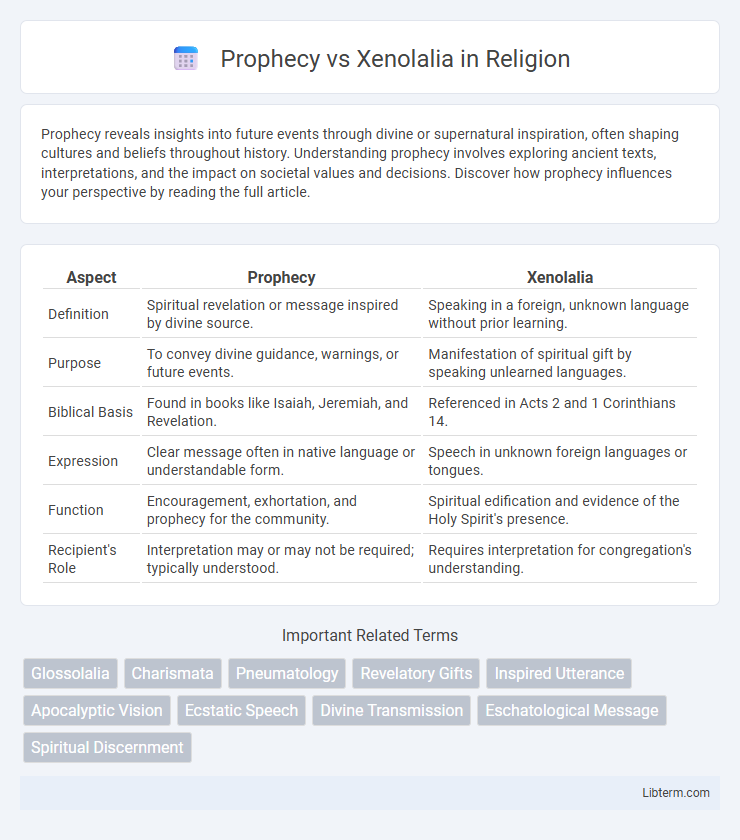Prophecy reveals insights into future events through divine or supernatural inspiration, often shaping cultures and beliefs throughout history. Understanding prophecy involves exploring ancient texts, interpretations, and the impact on societal values and decisions. Discover how prophecy influences your perspective by reading the full article.
Table of Comparison
| Aspect | Prophecy | Xenolalia |
|---|---|---|
| Definition | Spiritual revelation or message inspired by divine source. | Speaking in a foreign, unknown language without prior learning. |
| Purpose | To convey divine guidance, warnings, or future events. | Manifestation of spiritual gift by speaking unlearned languages. |
| Biblical Basis | Found in books like Isaiah, Jeremiah, and Revelation. | Referenced in Acts 2 and 1 Corinthians 14. |
| Expression | Clear message often in native language or understandable form. | Speech in unknown foreign languages or tongues. |
| Function | Encouragement, exhortation, and prophecy for the community. | Spiritual edification and evidence of the Holy Spirit's presence. |
| Recipient's Role | Interpretation may or may not be required; typically understood. | Requires interpretation for congregation's understanding. |
Understanding Prophecy: Definition and Origins
Prophecy, rooted in ancient religious traditions, is the inspired communication of divine messages predicting future events or revealing hidden knowledge. Unlike xenolalia, which involves speaking in unknown languages without comprehension, prophecy conveys meaningful insights believed to originate from a supernatural source. The practice of prophecy has deep historical origins across cultures, serving as a bridge between the divine and humanity through inspired revelation.
What Is Xenolalia? An Overview
Xenolalia is the phenomenon of speaking in a language unknown to the speaker, often described as a supernaturally inspired ability to communicate in foreign languages without prior knowledge. Unlike prophecy, which involves delivering revelations or messages believed to be divinely inspired, xenolalia specifically pertains to language acquisition through a spiritual or miraculous experience. Studies in linguistic and theological contexts examine xenolalia as a distinct form of spiritual expression, highlighting its role in religious practices such as Pentecostal and Charismatic movements.
Scriptural Foundations for Prophecy
Scriptural foundations for prophecy are rooted in numerous biblical passages, such as 1 Corinthians 14:3, which highlights prophecy as edification, exhortation, and comfort for the church. Prophecy in Scripture involves inspired revelation from God, often delivering specific guidance or encouragement to believers. Xenolalia, in contrast, lacks direct biblical endorsement as a normative spiritual gift, with its scriptural mentions being sparse and more ambiguous compared to the clearly defined role of prophecy.
Biblical Accounts of Xenolalia
Biblical accounts of xenolalia primarily appear in the Book of Acts, where believers are described as speaking in foreign tongues through the Holy Spirit, enabling them to communicate God's message to diverse audiences (Acts 2:4-11). Unlike prophecy, which involves revealing divine messages or insights for edification and exhortation (1 Corinthians 14:3), xenolalia specifically refers to miraculous foreign language speech unknown to the speaker but understood by listeners of different linguistic backgrounds. These occurrences underscore a distinct charismatic gift aimed at evangelism and cross-cultural communication in the early church.
Key Differences Between Prophecy and Xenolalia
Prophecy involves delivering a divinely inspired message in a known language that edifies, exhorts, or comforts the community, often revealing future events or spiritual truths. Xenolalia refers to speaking in an unknown or foreign language instantaneously without prior learning, typically regarded as a supernatural sign of the Holy Spirit's presence. Unlike prophecy, which communicates clear meaning to the audience, xenolalia's intelligibility depends on interpretation or subsequent translation.
The Purpose of Prophecy in Religious Context
Prophecy in religious contexts serves to communicate divine will, provide guidance, and affirm faith through predictive revelations or moral exhortations. Unlike xenolalia, which involves speaking in unknown languages without understood meaning, prophecy conveys comprehensible messages that often call for repentance, encouragement, or future insight. Its primary purpose is to strengthen community belief and align adherents with spiritual truths and divine purposes.
The Role of Xenolalia in Spiritual Experience
Xenolalia, the phenomenon of speaking in an unknown foreign language during spiritual experiences, serves as a profound expression of divine encounter and communication within many charismatic Christian contexts. Unlike prophecy, which conveys direct revelation or guidance from God, xenolalia uniquely highlights the experiential aspect of spirituality by enabling individuals to vocalize languages they have never learned, often interpreted as evidence of the Holy Spirit's presence. This supernatural language function deepens personal connection to the divine and fosters communal faith by exemplifying spiritual empowerment beyond cognitive understanding.
Historical Perspectives: How Prophecy and Xenolalia Have Been Perceived
Historical perspectives on prophecy highlight its role as a divinely inspired revelation guiding moral and spiritual decisions in ancient cultures, often documented in religious texts like the Bible and Quran. Xenolalia, the phenomenon of speaking in unknown foreign languages, has been less universally accepted, frequently viewed with skepticism or as a sign of spiritual possession within early Christian communities. Both practices were integral to the development of religious experiences but contrasted in perceived authenticity and societal acceptance across different historical contexts.
Contemporary Views and Controversies
Contemporary views on prophecy emphasize its role as inspired communication conveying divine guidance, while xenolalia is characterized by the spontaneous speaking of unknown human languages without prior learning. Debates continue around the authenticity and theological implications of both practices, with critics questioning the verifiability of xenolalia and the subjective nature of modern prophetic claims. Scholars analyze these phenomena within Pentecostal and Charismatic movements, highlighting tensions between experiential faith expressions and doctrinal consistency.
Prophecy vs. Xenolalia: Implications for Faith Communities
Prophecy in faith communities involves inspired messages that provide guidance, encouragement, or revelation, fostering communal understanding and spiritual growth. Xenolalia, the phenomenon of speaking in unlearned foreign languages, often raises questions about its authentic spiritual origin and practical impact on congregational edification. The contrasting roles of prophecy and xenolalia affect worship dynamics, accountability, and the discernment processes within diverse religious traditions.
Prophecy Infographic

 libterm.com
libterm.com